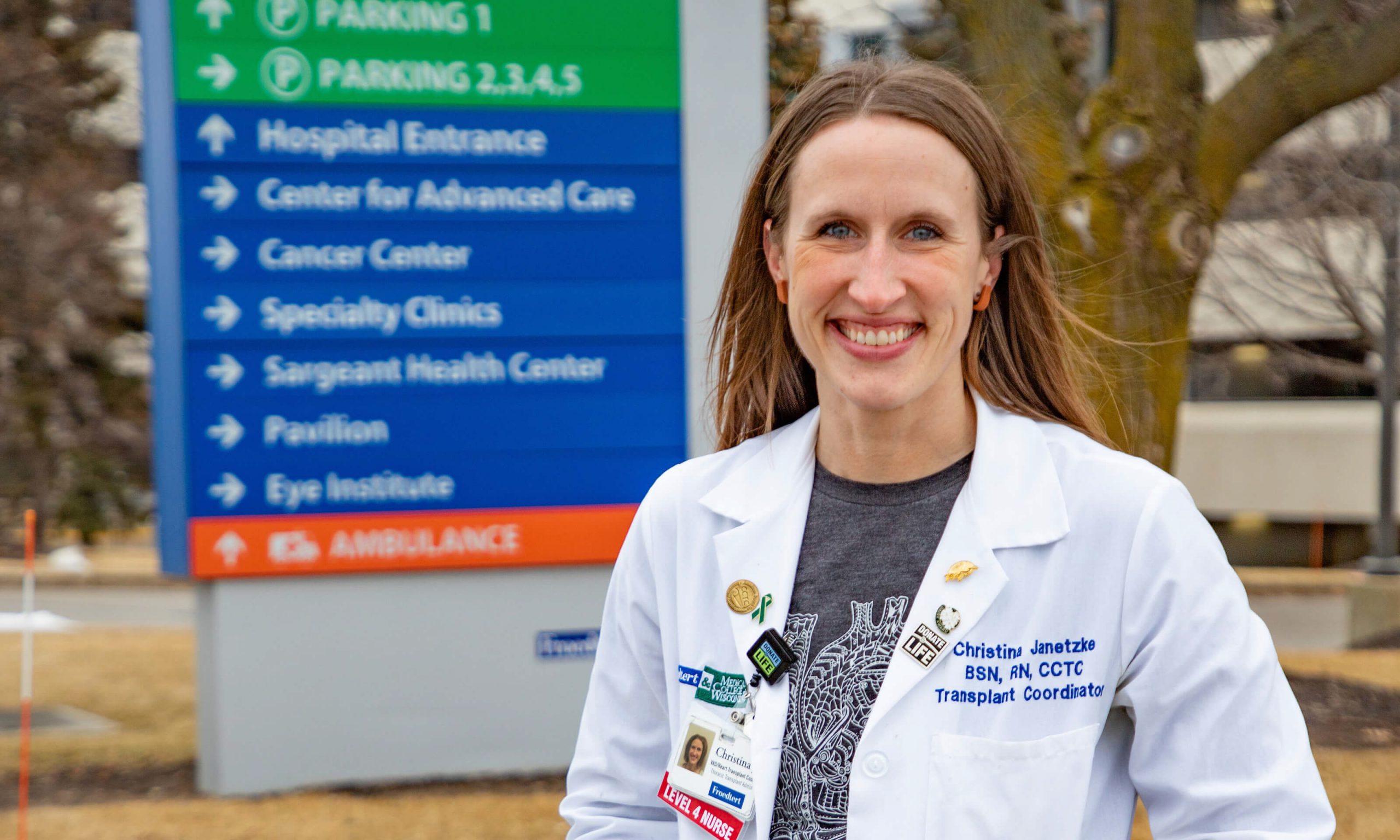
Cardiac nursing has long held a special place in Christina (Wingfield) Janetzke’s heart.
It’s no wonder either. In her role as a transplant nurse coordinator at Froedert Hospital, Janetzke has the privilege of walking alongside heart transplant patients in the months after they undergo their surgery, and on through the rest of their lives.
In the first year after a transplant Janetzke will see a patient upwards of 15 times. As time goes on, the visits become less frequent, but they remain a fixture in the person’s life.
“I almost become part of their family,” Janetzke said. “I just am ‘their person.’ I’ve had patients who have lived for 30-plus years post-transplant and I’ve remained a part of their lives through their regular check-ups. Some even send me Christmas cards each year. It’s really special.”
Increasing the number of heart donors
Janetzke, BSN, RN, CCTC, earned her bachelor’s from CUW in 2008 and since then has spent her entire career in the cardiac field, even working her way to the top of the field by pursuing specialized certifications. Her position recently earned her a spot among a ground-breaking heart transplant care team. In 2020, Frank Stenzel received a heart transplant as part of a national clinical trial aimed at increasing the pool of heart donors. Janetzke continues to serve as his post-operative nurse.
The Donor After Circulatory Death (DCD) Heart Trial looked at recovering hearts from donors who have irreversible brain injury but do not meet formal brain death criteria, and the family has decided to withdraw care. During a DCD transplant, the heart is preserved inside a machine that keeps it perfused with warm, oxygenated blood until it is transported to the recipient.
DCD transplants have been done for many years with other organs, including lungs, kidneys, and livers. Other countries have already performed DCD heart transplants as well, but it wasn’t until recently that the Food and Drug Administration approved the clinical trial in the United States. If fully approved in the U.S., the DCD base would open up a whole new, desperately needed pool of donors for those in need of a heart transplant. DCD transplants could expand the donor pool by about 30 percent, according to an article posted on the Froedtert and Medical College of Wisconsin website.
“There are way more people on a waiting list than there are available organs,” Janetzke said. “So anytime we can open up another pool of donors, it holds potential for impacting a whole lot of lives.”
Pursuing and encouraging excellence in the field
Had she not become a nurse, Janetzke said she likely would have pursued a degree in education. She comes from a family full of Lutheran school teachers. The work schedule of a nurse was appealing to her, however. Plus, she always felt drawn to the medical field.
Now that she’s more than a decade into her career, she says she entertains the idea of blending both.
“One day maybe I’ll teach. I’ll teach people how to be really good nurses,” Janetzke said. “Someday I’ll get back to my education piece that I never quite got to do.”
In the meantime, she relishes her job and the opportunity it gives her to perform with excellence.
“I work to the top of my scope. I use my license every day. I work hard and build relationships with patients, and I get to watch them thrive.”
A dedication to excellence was something she found at Concordia as well. Not only did CUW provide the faith-informed approach to subject matter that was so important to Janetzke, the professors pushed students to excel by secular standards as well.
“The nursing program at Concordia is amazing,” Janetzke said. “I remember going through school and working my externship and hearing about peers from other schools and their experiences. They were nothing compared to what I did at Concordia.”
Concordia also deserves a lot of the credit for helping Janetzke find her way to cardiology.
“Concordia really gave me the gambit of clinical experiences while I was there,” Janetzke said. “That helped me figure out where I wanted to be early on. My whole career now has been focused on cardiac care. That’s my love.”
Want in?
Learn more about Concordia’s School of Nursing and all available programs by clicking here.
Editor’s note: A version of this story first appeared in the spring 2022 issue of Hearts Together, a Concordia University Wisconsin and Ann Arbor special magazine edition. The spring/summer issue hit mailboxes in early May. View a PDF version of the magazine here. If you are not on our mailing list, but are interested in receiving a free copy, email Jennifer.Hackmann@cuaa.edu.
— This story is written by Kali Thiel, director of university communications for Concordia University Wisconsin and Ann Arbor. She may be reached at kali.thiel@cuw.edu or 262-243-2149.
If this story has inspired you, why not explore how you can help further Concordia's mission through giving.